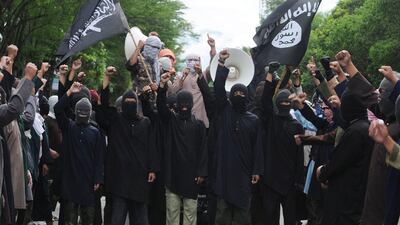This week is the fourth anniversary of the self-immolation of Mohammed Bouazizi, whose death sparked the democratic uprisings in the Arab world. However, four years on there seems to be very little democracy to go around.
So grave is the situation in parts of the region that the more fortunate countries appear to be the ones who have averted civil war, even if it means they have returned to authoritarianism.
This goes to the heart of the discussion on Arab democratisation. For decades, some Arab leaders employed blackmail to keep societies in line: if their people sought to change regimes, this would lead to destructive instability. It was understood that they would provoke such instability.
That is precisely what happened in Syria and Libya. Bashar Al Assad and Muammar Qaddafi triggered civil wars to survive, only to realise that they could not contain the dynamics unleashed. Mr Qaddafi was killed by rival gunmen, while Mr Al Assad’s chances of prevailing in Syria are next to nil.
And yet the democracy versus stability formula is stronger than ever.
Things seemed simpler in 2003, when the United States invaded Iraq, and the appeal of democratisation was in its early days. At the time, there was a view that the September 11, 2001, attacks were the consequences of tyranny in the Arab world. Young men, frustrated by the absence of freedom, embraced religion and even religious extremism, since governments were less able, or willing, to control religious domains. The argument went that it was young men like these who carried out the hijackings that day.
The Iraq invasion was seen by ideologues in the Bush administration as an opportunity to impose a democracy at the heart of the Arab world. This, in turn, would have an impact on neighbouring countries and spur democratisation there, thereby enhancing America’s security.
However, when the situation in Iraq deteriorated dramatically in 2003-04, all discussion of democracy was abandoned. The Bush administration was accused of naïveté, and inside the United States the mood turned against the Iraq campaign.
Successful Iraqi elections in January 2005, coupled with the mass demonstrations in Lebanon against Syrian hegemony in February-March the same year, suggested that democracy remained a burning issue. Yet both Iraq and Lebanon were blindsided by reality as political polarisation followed and democracy was again seen as a fleeting, fragile phenomenon.
When Barack Obama took office, it quickly became clear that the United States no longer was keen to bolster democracy in the Middle East. In Mr Obama’s much-vaunted speech in Cairo, the president paid only lip service to democratisation. And when the Iranian regime brutally repressed demonstrations following the re-election of Mahmoud Ahmadinejad in 2009, Mr Obama remained silent.
The United States did push its old ally Hosni Mubarak out of office in 2011, as he faced massive popular opposition. However, this was done mainly to avoid losing influence in Egypt, not because the administration was suddenly moved by Arab democratic aspirations. Indeed, when Syrians began opposing their regime the same year, Washington did nothing to assist them – nor has it since.
As violence in the Arab countries has increased, the appeal of democracy has evaporated. This has lent credence to the argument that Arab societies don’t have the institutions to “move from an amorphous longing for freedom to a well-functioning consolidated democratic political system with a modern economy”, to quote Francis Fukuyama.
Perhaps, but there is something circular in that argument, since it implies that only societies with quasi-democratic institutions can become democracies. It is unfortunate that Mr Fukuyama’s culturally deterministic claim has become the prevailing wisdom as the world watches many of those Arab societies that revolted in 2011 descend into barbarism.
With western countries now obsessed with the rise of ISIL, a new equation is taking hold: that it’s better to deal with vicious, but predictable, dictators against Islamic extremism, than to allow Arab societies to choose their representatives, since invariably these will be Islamists of one stripe or another.
That is precisely the argument Arab dictators once employed. Yet what many in the west won’t recognise is that it was the secular Arab dictatorships that gave impetus to Islamists in the first place. And the more ferocious the regime, the more savage the Islamist counter-reaction as violence begets violence.
That is why those who, for instance, today call for collaboration with Mr Al Assad against ISIL don’t get it. The Syrian regime acts as a magnet for ISIL, and as long as it remains in place the appeal of Islamic extremists will be high, as they are viewed as the most effective foes of Mr Al Assad’s despotism.
In reality, the democracy debate has only just started. Thanks to Tunisia, from where Bouazizi hailed, that discussion can take place in a more nuanced way. Tunisia has charted a path towards a more democratic constitutional order. Elsewhere, Lebanon, for all its many dysfunctions, has long had a system of tolerant pluralism. Arabs are not invariably destined to either embrace dictators or dissolve into civil war.
It is unlikely that many will defend this opinion. Arab democrats not only face repressors within their own societies, they must also contend with western societies who, sometimes arrogantly, believe they have a monopoly over democracy.
Michael Young is opinion editor of The Daily Star newspaper in Beirut
On Twitter: @BeirutCalling


